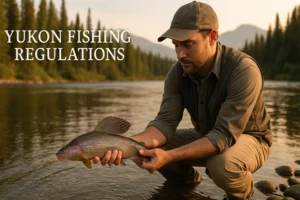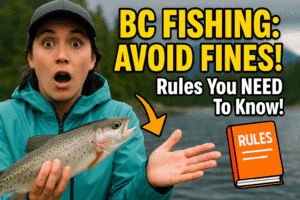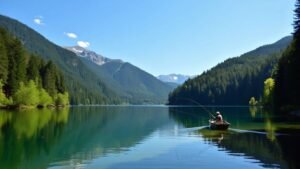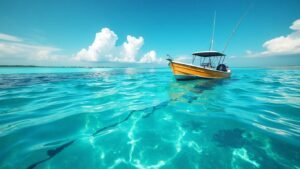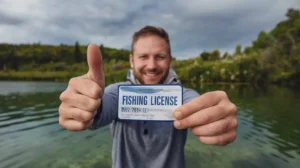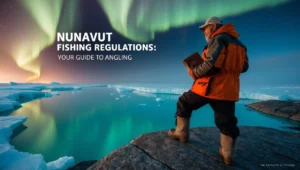Did you know that over 3 million people in Canada, with recreational angling licences, go fishing each year, following sportfishing regulations?
Whether you’re a seasoned angler or a novice, understanding fishing regulations and licenses is crucial. Navigating the waters of legal requirements can be daunting, but fear not – we’ve got you covered.
We’ll demystify the world of fishing regulations and licenses in Canada, providing you with essential insights to ensure your angling adventures are both enjoyable and compliant.From understanding catch limits to obtaining the right permits, we’ll delve into the intricacies of fishing regulations across Canadian provinces and territories.
We’ll shed light on the vital role that licenses play in conservation efforts and how they contribute to sustainable fishing practices. So, whether you’re casting your line in the pristine lakes of Ontario, the coastal waters of British Columbia, or the rivers of Quebec, equipping yourself with the knowledge of fishing regulations and licenses is key to preserving our natural resources for generations to come.
Key Takeaways about Fishing Regulations and Licenses
- Get the Right License: Make sure to understand the different types of fishing licenses available in Canada and choose the one that best suits your needs and fishing activities.
- Know the Regulations: Familiarize yourself with the provincial variations in fishing regulations and contact to ensure compliance with the specific rules and limits in your area.
- Consider the Outdoors Card: Understand the significance of the Outdoors Card, which serves as a prerequisite for purchasing fishing licenses in some provinces, and obtain it if necessary.
- Family-Friendly Fishing: Explore family and accessible fishing options to make the experience enjoyable for everyone, considering special regulations and exemptions for young or disabled anglers.
- Be Informed About Fees: Be aware of the fees associated with fishing licenses and the various methods available for purchasing them to ensure a smooth and legal fishing experience. Contact the relevant authorities for more information.
- Respect the Limits: Adhere to fishing rules and limits to contribute to sustainable fishing practices and preserve the natural resources for future generations.
Understanding Fishing Licenses in Canada
Licence Requirements
To fish in Ontario, having a provincial freshwater fishing licence is essential to contact. It allows individuals to engage in recreational fishing activities legally, contact. There are two main types of licences available: the Sport fishing licence and the Conservation fishing licence. The Sport fishing licence permits anglers to keep a certain number of fish, while the Conservation fishing licence focuses on catch-and-release practices to conserve fish populations. Anglers must also possess an Outdoors Card, which serves as identification for purchasing a fishing licence and is required for all fishing activities in Ontario.
Age Eligibility
In Ontario, individuals under the age of 18 and 65 years or older are exempt from purchasing a fishing licence. However, those between these age brackets need to obtain a fishing licence. For Canadian residents aged 18-64, a fishing licence is mandatory. Residents under 18 and over 65 can fish without a licence according to freshwater fishing regulations. Individuals with disabilities requiring assistance for fishing are eligible for exemptions based on specific age criteria and disability status.
Residency Criteria
For fishing in Ontario, it’s crucial to understand the residency criteria. An Ontario resident is someone whose primary residence is in Ontario for at least six consecutive months during the year before applying for the licence. A Canadian resident refers to someone whose primary residence is in Canada but outside of Ontario. Non-Canadian residents are individuals whose primary residence is outside of Canada. Each category has different requirements for obtaining a fishing licence.
Exemptions Overview
There are several exemptions from purchasing a fishing licence in Ontario. Persons with disabilities requiring direct assistance for fishing are eligible for exemptions based on specific criteria related to their disability status and the need for assistance. Moreover, active members or veterans of the Canadian Armed Forces are exempt from purchasing a fishing licence as a token of appreciation for their service to the country.
Types of Fishing Licences
Recreational Licences

Recreational fishing in Ontario requires a valid fishing licence, and there are different types to consider. The general fishing licence allows individuals to fish in most Ontario waters, while the sport fishing licence is for those who want to catch and retain fish. On the other hand, the conservation fishing licence is ideal for those who enjoy catch-and-release fishing and wish to conserve fish populations.
The general fishing licence provides access to various fishing opportunities across the province, including both inland and border waters. In contrast, the sport fishing licence offers additional privileges such as the ability to keep a larger number of fish or access specific conservation areas. Moreover, the conservation fishing licence encourages sustainable fishing practices by promoting the release of certain fish species back into the water.
To obtain a recreational fishing licence in Ontario, individuals can visit authorized vendors or make online purchases through the Ministry of Natural Resources and Forestry’s website. It’s essential to ensure that the chosen vendor is authorized to issue fishing licences and report cards. Applicants may need to provide personal identification and be aware of any age-related eligibility criteria.
The Outdoors Card Explained

Applying for the Card
To apply for an Outdoors Card in Ontario, individuals need to understand the straightforward process. Firstly, they must decide whether they need a fishing version, a hunting version, or both. Then, they can fill out the application form available on the official website. After completing the form, applicants are required to submit it along with the necessary documentation.
The documentation required for applying for an Outdoors Card includes proof of identity and residency. This may include a driver’s license, health card, or other government-issued identification. Individuals may need to provide their outdoors card number from the previous year if they are renewing their card. Ensuring that all the required documents are in order is crucial to avoid any delays in the application process.
Applicants have the option of applying for an Outdoors Card online or through participating ServiceOntario locations. The online method offers convenience and efficiency, allowing individuals to complete the application from the comfort of their homes. On the other hand, applying in person at ServiceOntario locations provides an opportunity for face-to-face assistance and guidance throughout the application process.
Benefits and Uses
One of the key benefits of holding an Outdoors Card for fishing in Ontario is that it serves as a prerequisite for purchasing a fishing license. This means that anglers must possess a valid Outdoors Card before obtaining a fishing license, ensuring compliance with provincial regulations. Moreover, the Outdoors Card simplifies the process of purchasing subsequent licenses by storing personal information.
Apart from fishing, an Outdoors Card has various uses beyond angling activities. It acts as a gateway to numerous outdoor recreational opportunities in Ontario, including hunting and trapping. Therefore, individuals interested in engaging in these activities will find an Outdoors Card invaluable. Furthermore, possessing an Outdoors Card demonstrates a commitment to responsible and ethical participation in outdoor pursuits.
An additional advantage of holding an Outdoors Card is its role in streamlining administrative processes for anglers. With personal information securely stored in the system, individuals can easily purchase fishing licenses each year without re-entering their details. This not only saves time but also ensures accuracy in license issuance. Overall, an Outdoors Card offers convenience and efficiency for outdoor enthusiasts in Ontario.
Provincial Variations in Regulations
Licensing Differences
When it comes to fishing, choosing the right licence is crucial. A Sport fishing licence is for recreational angling, while a Conservation fishing licence focuses on conservation. The Sport licence allows keeping a certain number of fish, whereas the Conservation licence requires catch-and-release only.
The key difference lies in the catch and possession limits. With a Sport fishing licence, anglers can keep a specified number of fish within the legal size limit. Conversely, a Conservation fishing licence mandates catch-and-release for all fish caught. It’s vital to understand these distinctions to ensure compliance with the regulations.
Selecting the appropriate fishing licence depends on your preferences and needs. If you enjoy keeping some of your catch for consumption, then the Sport fishing licence is suitable. On the other hand, if you prioritize conservation and sustainable fishing practices, the Conservation fishing licence aligns with these values.
Licence Type | Sport Fishing Licence | Conservation Fishing Licence |
|---|---|---|
Purpose | Recreational angling | Conservation |
Catch and Possession | Allows keeping a specified | Mandates catch-and-release for |
Limits | number of fish within legal | all fish caught |
size limit | ||
Preference | Enjoy keeping catch for | Prioritize conservation and |
consumption | sustainable fishing practices |
Seasonal Restrictions
In Ontario, seasonal restrictions are in place to protect fish populations during critical periods. These regulations aim to safeguard spawning seasons and ensure sustainable fish populations for future generations. It’s essential for anglers to adhere to these restrictions to contribute to the preservation of aquatic ecosystems.
Understanding the specific periods and areas where seasonal restrictions apply is crucial. For instance, certain lakes or rivers may have closed seasons to protect spawning fish. Some species may be off-limits during specific times of the year to allow them to reproduce undisturbed. By being aware of these regulations, anglers can actively participate in conservation efforts.
Adhering to seasonal restrictions not only preserves fish populations but also contributes to maintaining a balanced ecosystem. By respecting these regulations, anglers play a pivotal role in promoting sustainable fishing practices and ensuring the longevity of various fish species.
Indigenous Individuals’ Rights
Indigenous communities in Ontario hold significant rights pertaining to fishing activities. These rights are exercised through modern means while adhering to traditional principles and values. Indigenous individuals have exemptions and specific requirements related to obtaining fishing licences, acknowledging their unique cultural and historical connection to fishing practices.
The exercise of Aboriginal and treaty rights allows Indigenous communities to engage in traditional fishing activities using modern methods. This approach respects their cultural heritage while integrating contemporary approaches to fishing. Understanding and respecting these rights is fundamental for fostering harmonious relationships between Indigenous and non-Indigenous individuals engaging in fishing activities.
Family and Accessible Fishing
Family Fishing Opportunities
Ontario and Canadian residents can enjoy recreational fishing without purchasing a license during designated family fishing weekends and weeks. These events typically occur in February, July, and August, offering an excellent opportunity for families to bond over the joy of fishing. The Ontario government allows individuals to fish without a license during these specific dates, encouraging families to experience the thrill of angling together.
The family fishing weekends and weeks are carefully scheduled to coincide with special occasions such as Father’s Day and National Fishing Week. This thoughtful planning not only encourages family participation but also promotes the significance of fishing as a recreational activity for bonding and relaxation. During these periods, both residents and non-residents can partake in the excitement of fishing without the need for a license, fostering a sense of community and enjoyment among all participants.
One of the key benefits of family fishing opportunities in Ontario is the chance for families to engage in outdoor activities while fostering a deeper connection with nature. These events serve as an excellent introduction for children to learn about responsible fishing practices and conservation efforts. The regulations associated with family fishing ensure that participants adhere to size limits and possession regulations, promoting sustainable fishing practices among all anglers.
10 Fun Family Fishing Activities to Enjoy Together
- Host a family fishing competition with prizes for the biggest catch, smallest catch, and most unique fish.
- Organize a family fishing picnic, where everyone can enjoy a day of fishing followed by a delicious outdoor meal.
- Plan a family fishing trip to a nearby lake or river, complete with camping and outdoor activities for the whole family to enjoy.
- Create a family fishing club where members can share tips, tricks, and stories about their fishing adventures.
- Arrange a family fishing workshop to teach children and adults about different fishing techniques and equipment.
- Coordinate a family fishing clean-up event, where participants can fish while also helping to clean up the surrounding area.
- Schedule a family fishing day at a local conservation area, where families can learn about the importance of preserving natural habitats.
- Host a family fishing fundraiser to support local conservation efforts or wildlife rehabilitation programs.
- Plan a family fishing vacation to a destination known for its excellent fishing opportunities, such as a coastal town or remote fishing lodge.
- Organize a family fishing reunion, bringing together extended family members for a weekend of fishing, storytelling, and bonding by the water.
Accessible Options
Individuals with disabilities in Ontario have access to various accommodations and exemptions designed to facilitate their participation in fishing activities. The province offers specialized programs and initiatives that cater to persons requiring direct assistance for fishing, ensuring that everyone can enjoy this recreational pursuit. These inclusive measures are aimed at providing equal opportunities for individuals with disabilities to engage in angling activities alongside their peers.
Exemptions from fishing licenses are available for persons with disabilities who require direct assistance while engaging in fishing activities. Furthermore, designated accessible fishing locations feature facilities tailored to accommodate individuals with mobility challenges, allowing them to experience the joys of angling comfortably. These locations are equipped with amenities such as accessible docks, pathways, and parking spaces, ensuring that individuals with disabilities can access these sites with ease.
In line with promoting inclusivity, various organizations collaborate with local authorities to organize adaptive fishing events tailored specifically for individuals with disabilities. These initiatives not only provide an opportunity for social interaction but also contribute to enhancing the overall well-being of participants. By creating a supportive environment that fosters accessibility, Ontario ensures that fishing remains an enjoyable and enriching experience for all individuals.
Fees and Purchasing Licences
Licence Fees Breakdown
Understanding the breakdown of fees associated with recreational fishing licences in Ontario is crucial for anglers. The Sport fishing licence costs $15.21 for a one-day permit and $26.57 for an eight-day permit. On the other hand, the Conservation fishing licence is priced at $9.68 for a one-day permit and $15.07 for an eight-day permit. These fees contribute to the preservation and sustainability of fish populations in the region.
The pricing structure and categories for fishing licences in the province are tailored to meet the diverse needs of anglers. Anglers can choose from various options, including resident and non-resident licences, as well as different durations such as one-day, eight-day, or annual permits. This flexibility ensures that individuals can select a licence that aligns with their fishing preferences and frequency.
The cost differences between a Sport fishing licence and a Conservation fishing licence reflect the varying regulations and conservation efforts associated with each type. By opting for a Conservation fishing licence, anglers actively contribute to the conservation of fish species and their habitats while enjoying the recreational activity. This distinction encourages responsible fishing practices and environmental stewardship among anglers.
Fishing Licence Type | One-Day Permit Cost | Eight-Day Permit Cost |
|---|---|---|
Sport fishing licence | $15.21 | $26.57 |
Conservation fishing licence | $9.68 | $15.07 |
Where to Buy
Exploring the various locations and methods for purchasing fishing licences in Ontario provides convenience for anglers. Anglers can conveniently purchase licences online through the official website of the Ministry of Natural Resources and Forestry (MNRF). Numerous authorized vendors, including bait shops, outdoor stores, and ServiceOntario locations, offer in-person sales of fishing licences across the province.
The accessibility of purchasing fishing licences in Ontario is further enhanced by the availability of Outdoors Card issuing agents. These agents facilitate the issuance of Outdoors Cards, which are essential for purchasing fishing licences in the province. Anglers can obtain their Outdoors Card either online or by visiting designated ServiceOntario locations.
Understanding the online platforms and physical stores where fishing licences are available empowers anglers to acquire their permits conveniently. This accessibility ensures that individuals can obtain their licences promptly, enabling them to engage in recreational fishing activities without delays or complications.
- Anglers can conveniently purchase licences online through the official website of the Ministry of Natural Resources and Forestry (MNRF)
- Authorized vendors, including bait shops, outdoor stores, and ServiceOntario locations, offer in-person sales of fishing licences across the province
- Outdoors Card issuing agents facilitate the issuance of Outdoors Cards, which are essential for purchasing fishing licences in the province
- Anglers can obtain their Outdoors Card either online or by visiting designated ServiceOntario locations
- Accessibility ensures that individuals can obtain their licences promptly, enabling them to engage in recreational fishing activities without delays or complications
Necessary Items for Fishing
Discovering the essential items and documents required for fishing in Ontario is vital for compliance with regulations. Carrying an Outdoors Card or licence summary while fishing is mandatory for all anglers aged 18-64. This card serves as proof of angler identification and validates their eligibility to possess a fishing licence in Ontario.
In addition to the Outdoors Card, anglers must ensure they possess any relevant permits or tags specific to certain fish species or locations. Having these necessary documents not only demonstrates adherence to regulations but also contributes to sustainable resource management by monitoring catch limits and species-specific regulations.
The essential equipment required for fishing includes appropriate rods, reels, lines, hooks, baits, and lures tailored to target specific fish species. It is imperative that anglers equip themselves with suitable gear to comply with regulations while engaging in responsible angling practices.
Fishing Rules and Limits
General Guidelines
When it comes to fishing rules and limits in Ontario, it’s crucial for anglers to understand the regulations to ensure responsible and sustainable fishing practices. Anglers should familiarize themselves with the provincial and federal fishing rules to avoid any legal implications. The rules encompass various aspects such as catch limits, size restrictions, and designated conservation areas.
Anglers must adhere to the best practices for ethical fishing, including proper handling of fish, respecting catch limits, and releasing undersized or protected species. It’s essential to prioritize the well-being of aquatic ecosystems by following guidelines that promote conservation and sustainability. Anglers should be aware of the specific rules related to different bodies of water, ensuring compliance with freshwater fishing regulations.
Understanding the regulations and responsibilities associated with recreational fishing activities is crucial for maintaining the ecological balance of Ontario’s water bodies. Anglers play a significant role in preserving the natural habitat and ensuring the longevity of fish populations. By adhering to fishing regulations, anglers contribute to the overall conservation efforts and sustainable management of Ontario’s fisheries.
Fishing Rules and Limits in Ontario | Best Practices for Ethical Fishing |
|---|---|
Understand provincial and federal fishing rules | Proper handling of fish |
Familiarize with catch limits, size restrictions, and conservation areas | Respect catch limits |
Adhere to specific rules for different bodies of water | Release undersized or protected species |
Ensure compliance with freshwater fishing regulations | Prioritize the well-being of aquatic ecosystems |
Contribute to conservation efforts and sustainable management | Promote conservation and sustainability |
Non-Residents Regulations
For non-Canadian residents interested in fishing in Ontario, there are specific regulations and requirements to consider. Non-residents are typically required to obtain an Outdoors Card, which serves as a form of identification for participating in outdoor recreational activities, including fishing. A recreational fishing licence is necessary for non-residents to engage in sportfishing activities within the province.
Exemptions may apply under certain conditions for non-Canadian residents regarding fishing in Ontario. These exemptions often relate to age-based criteria or participation in organized events or programs sanctioned by relevant authorities. Non-residents should thoroughly review the exemptions and conditions to ensure compliance with the regulations governing recreational fishing in Ontario.
It’s important for non-residents to stay informed about the fishing licence regulations and any updates or changes that may impact their eligibility to fish in Ontario. By understanding the non-residents’ regulations, individuals can enjoy their angling experiences while upholding the legal requirements set forth by the provincial authorities.
Preparing to Fish Legally
Checklist Before Fishing
Before heading out to fish in Ontario, it’s crucial to have all the necessary items and documents ready. Valid fishing license tops the list, ensuring compliance with the regulations. It’s essential to check the fishing season for the specific area you plan to visit.
Ensuring that your fishing license is valid and up-to-date is of utmost importance. It’s advisable to verify the status and expiry date of your fishing license before each trip. This simple step can prevent any legal issues and ensure a hassle-free fishing experience. Moreover, having a clear understanding of the fishing season for the area you intend to fish in is vital to avoid any violations.
To have a smooth and compliant fishing experience, it’s crucial to follow essential steps. First, make sure to carry your valid fishing license at all times during your fishing trip. Secondly, familiarize yourself with the specific fishing regulations for the area you plan to visit. Lastly, always respect the catch limits and other rules set by the authorities.
Mastering the Art of Fishing: Essential Checklist and Tips for a Successful Trip
- Create a checklist for essential fishing gear, including rods, reels, bait, tackle, and a valid fishing license.
- Research the specific fishing season for different areas in Ontario to plan your trips accordingly.
- Set reminders to check the expiry date of your fishing license before each fishing trip.
- Join a local fishing club or online community to stay updated on fishing regulations and best practices.
- Take a fishing safety course to ensure you are well-prepared for any situation while out on the water.
- Invest in a durable and reliable fishing tackle box to keep all your gear organized and easily accessible.
- Consider hiring a local fishing guide for new or unfamiliar fishing spots to maximize your chances of a successful catch.
- Keep a record of your catches and any rule violations to improve your fishing skills and stay compliant with regulations.
- Attend fishing workshops or seminars to learn about new techniques, equipment, and conservation efforts in the fishing community.
- Share your knowledge and experiences with other anglers to promote responsible and sustainable fishing practices.
Troubleshooting Guide
While enjoying your fishing experience in Ontario, it’s essential to be prepared for common issues that may arise. In case of any problems related to your fishing license, there are measures you can take. If your fishing license is not readily available due to misplacement or loss, it’s important to remain calm and report the issue immediately.
In situations where your fishing license is not readily available, there are procedures to follow. Contacting the relevant authorities or visiting their website can provide guidance on obtaining a temporary permit or resolving any issues with your existing license. It’s essential to remain proactive and seek assistance promptly.
For resolving fishing-related problems, various resources and contacts are available in Ontario. These include local conservation officers, online portals for reporting issues, and helpline numbers for immediate assistance. Being aware of these resources can be immensely helpful in addressing any concerns or queries related to fishing regulations and licenses.
Benefits of Compliant Fishing
Conservation Efforts
Conservation efforts in Ontario play a crucial role in protecting fish populations and preserving the natural environment. Anglers actively participate in these initiatives, ensuring sustainable fishing practices. The government has implemented strict regulations to control fishing activities, such as catch limits and seasonal restrictions. These measures aim to maintain healthy fish populations and prevent overfishing.
By adhering to fishing regulations, anglers contribute to the conservation of fish species and their habitats. They help maintain a balance in aquatic ecosystems, preventing the depletion of certain fish species. Organizations and agencies work together to conduct research on fish populations, monitor water quality, and implement habitat restoration projects. These efforts ensure the long-term sustainability of fisheries in Ontario.
Conservation measures not only benefit fish populations but also contribute to the overall health of aquatic ecosystems. By protecting fish habitats and maintaining biodiversity, these efforts support the well-being of other wildlife species that depend on healthy aquatic environments. Furthermore, sustainable fishing practices promote responsible stewardship of natural resources for future generations.
Supporting Local Communities
Engaging in compliant fishing practices supports local communities by contributing to their economic and social well-being. When anglers obtain fishing licenses and adhere to regulations, they invest in the local economy through license fees and related expenditures. These financial contributions help fund conservation programs and support the maintenance of recreational fishing areas.
Sustainable fishing practices also create opportunities for local businesses, such as bait and tackle shops, guide services, and hospitality establishments. Anglers who comply with regulations contribute to the growth of these businesses, enhancing the local economy. Moreover, responsible fishing activities attract tourists and visitors, promoting tourism in rural areas and providing employment opportunities for local residents.
The positive impact of compliant fishing extends beyond economic aspects. It fosters a sense of community among anglers, conservation organizations, and local residents who share a common interest in preserving natural resources. Through collaborative efforts, these communities work towards ensuring the sustainability of fisheries while promoting environmental awareness and education.
Supporting Local Communities |
|---|
Economic Impact |
– Fishing license fees |
– Expenditures |
– Funding conservation programs |
– Supporting local businesses |
Social Impact |
– Opportunities for local businesses |
– Promotion of tourism in rural areas |
– Employment opportunities for local residents |
Community Engagement |
– Collaboration for sustainability of fisheries |
– Promotion of environmental awareness and education |
Final Remarks
You now have a comprehensive understanding of fishing licenses and regulations in Canada. Knowing the various types of licenses, the significance of the Outdoors Card, and the provincial variations in regulations equips you to navigate the legal aspects of angling. By being aware of the fees, fishing rules, and limits, you can ensure compliance while enjoying the outdoors responsibly. Understanding the benefits of compliant fishing not only safeguards the environment but also contributes to the sustainability of fish populations for future generations.
As you gear up for your next fishing adventure, remember to prioritize obtaining the necessary licenses and adhering to the regulations. By doing so, you are not only safeguarding the natural resources but also setting an example for others to follow. Tight lines and happy fishing!
Frequently Asked Questions about Fishing Regulations and Licenses
What types of fishing licenses are available in Canada?
In Canada, you can obtain different types of fishing licenses such as a conservation fishing license, sport fishing license, and Aboriginal communal fishing license. Each type has specific regulations and restrictions tailored to different fishing activities and groups.
How can I purchase a fishing license in Canada?
You can purchase a fishing license in Canada online through the official government website, at participating retailers, or by visiting a ServiceOntario location. Ensure you have the necessary personal identification and be prepared to provide information about your residency status.
Are there variations in fishing regulations between Canadian provinces?
Yes, there are variations in fishing regulations between Canadian provinces. Each province has its own set of rules regarding fishing seasons, catch limits, and permitted gear. It’s crucial to familiarize yourself with the specific regulations of the province where you plan to fish.
What are the benefits of obtaining a compliant fishing license?
Obtaining a compliant fishing license ensures that you are legally allowed to fish in designated areas, contributing to the conservation of fish populations and their habitats. Having a valid license allows you to enjoy the recreational and health benefits of fishing without facing penalties or fines.
What is an Outdoors Card and why is it important for fishing in Canada?
The Outdoors Card is a plastic identification card issued by the Ontario Ministry of Natural Resources and Forestry. It is required for residents and non-residents who wish to purchase a fishing license in Ontario. The card helps authorities track anglers’ compliance with fishing regulations and facilitates the purchasing process.
Related Blog Posts
Yukon Fishing Regulations Explained
Understand Yukon Fishing Regulations: Your simple guide to licenses, seasons, catch limits, and barb…
Read MoreBritish Columbia Fishing Regulations: Simple Guide
Learn key British Columbia Fishing Regulations. Easy guide to licences, rules, and smart fishing in …
Read MoreUnforgettable Manitoba Fly In Fishing Adventures: Explore the Untamed Wilderness
Discover thrilling fly-in fishing adventures in Manitoba's pristine lakes and untouched wilderness. …
Read MoreEssential Guide to Obtaining Your Fishing and Hunting License in Ontario
Get your fishing and hunting license in Ontario with our essential guide. Easy steps and tips for a …
Read MoreEverything You Need to Know About Obtaining a Fishing License for Ocean Adventures
Learn how to get your fishing license for ocean adventures, covering types, costs, and application t…
Read MoreNational Parks Fishing Regulations: What to Know
Discover essential National Parks Fishing Regulations for Canada's protected areas. Learn about perm…
Read MoreHow to Obtain a Fishing License in Canada
Learn how to obtain a fishing license in Canada, including provincial requirements, fees, and applic…
Read More